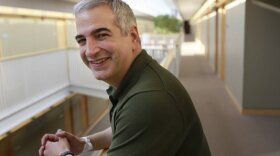
Quil Lawrence
Quil Lawrence is a New York-based correspondent for NPR News, covering veterans' issues nationwide. He won a Robert F. Kennedy Award for his coverage of American veterans and a Gracie Award for coverage of female combat veterans. In 2019 Iraq and Afghanistan Veterans of America honored Quil with its IAVA Salutes Award for Leadership in Journalism.
Lawrence started his career in radio by interviewing con men in Tangier, Morocco. He then moved to Bogota, Colombia, and covered Latin America for NPR, the BBC, and The LA Times.
In the Spring of 2000, a Pew Fellowship sponsored his first trips to Iraq — that reporting experience eventually built the foundation for his first book, Invisible Nation: How the Kurds' Quest for Statehood is Shaping Iraq and the Middle East (Bloomsbury, 2009).
Lawrence has reported from throughout the Arab world and from Sudan, Cuba, Pakistan, Israel, Gaza, and the West Bank. He covered Iraq and Afghanistan for twelve years, serving as NPR's Bureau Chief in Baghdad and Kabul. He covered the fall of the Taliban in 2001, the invasion of Iraq in 2003, the second battle of Fallujah in 2004, as well as politics, culture, and war in both countries.
In 2012, Lawrence returned to the U.S. to cover the millions of men and women who have served at war, both recently and in past generations. NPR is possibly unique among major news organizations in dedicating a full-time correspondent to veterans and the Department of Veterans Affairs.
A native of Maine, Lawrence studied history at Brandeis University, with concentrations in the Middle East and Latin America. He is fluent in Spanish and conversant in Arabic.
-
Iraq and Afghanistan veterans may have trouble answering questions about what war was like — but Vietnam veterans say they weren't even asked. Composer and Vietnam vet Kimo Williams says he turned to music to explain his war experience, and that it continues to define his work.
-
Iraq vet Brian Castner wrote a memoir of post-traumatic stress disorder and a difficult homecoming. His book, The Long Walk, got good reviews. But Castner never expected that it would get turned into an opera in New York City.
-
Many details have emerged about the American soldier suspected of gunning down 16 Afghan civilians in Kandahar province. But little has been reported about those who were killed or the five still recovering. One Afghan farmer lost nearly his entire family in the attack.
-
The massacre in Kandahar province was the latest in a string of bad news out of Afghanistan, which may have shifted the dynamic between the Afghan people and the American-led army that has been occupying the country for a decade. NPR's Quil Lawrence reports on President Hamid Karzai's demand that U.S. troops leave Afghanistan's villages and withdraw to larger bases around the country.
-
The Afghan security forces now include hundreds of women, but they can face significant risks. In the northern city of Mazar-e-Sharif, policewomen say abuse is widespread and even includes rape by their male colleagues.
-
Two U.S. troops were shot dead by an Afghan soldier in a day of riots and protests across the country over Qurans that were burned. U.S. forces and Afghan authorities are braced for more trouble following Friday prayers at mosques nationwide.
-
Traumatic brain injuries are often caused by a blast: A bomb explodes, and the concussive effect violently shakes the brain. The Army has had a mixed record treating soldiers for TBI. Now it's trying to spot the injury close to the battle and get soldiers out of the fight.
-
NPR foreign correspondent Quil Lawrence recalls his friendship with the New York Times reporter, who died Thursday at age 43, and the passion and sincerity that made him such a brilliant reporter.
-
Afghanistan is suffering an unusually harsh winter, and the government has been unable to meet the needs of the poor who lack proper shelter. The deaths of at least two dozen children have been blamed on the weather.
-
U.S. and Afghan officials have resumed talks on a deal that will determine how many American troops stay after the NATO mission ends. But until a deal is signed, it's hard for Afghans to know what's ahead, and the uncertainty may be helping the insurgents.









